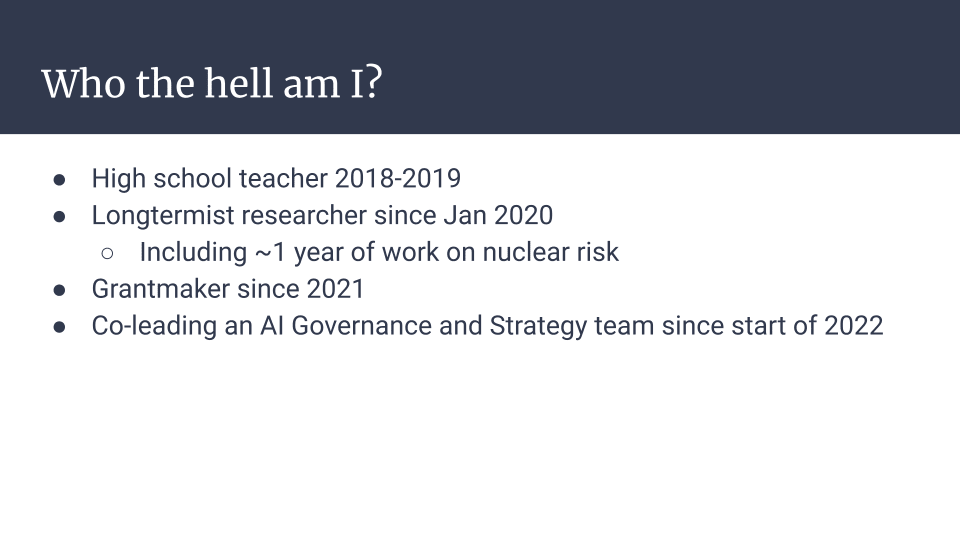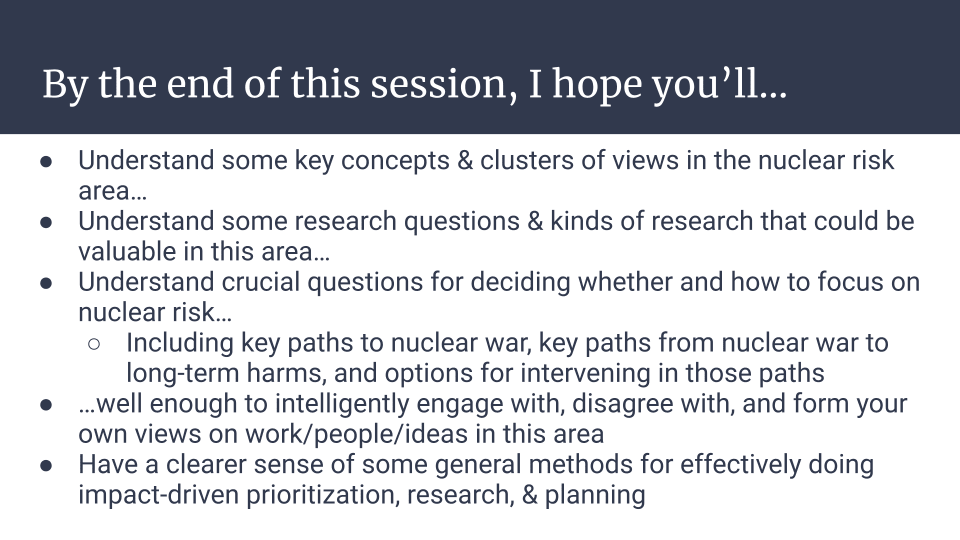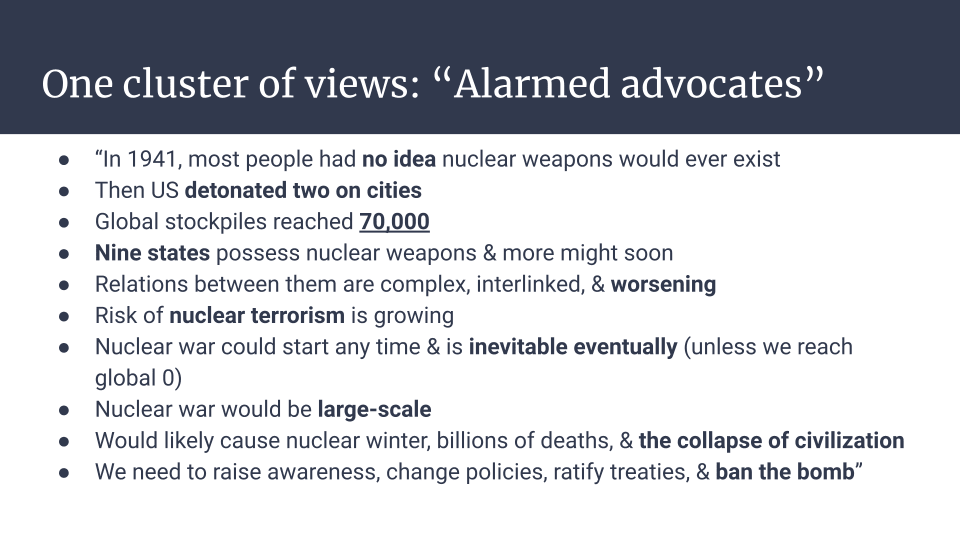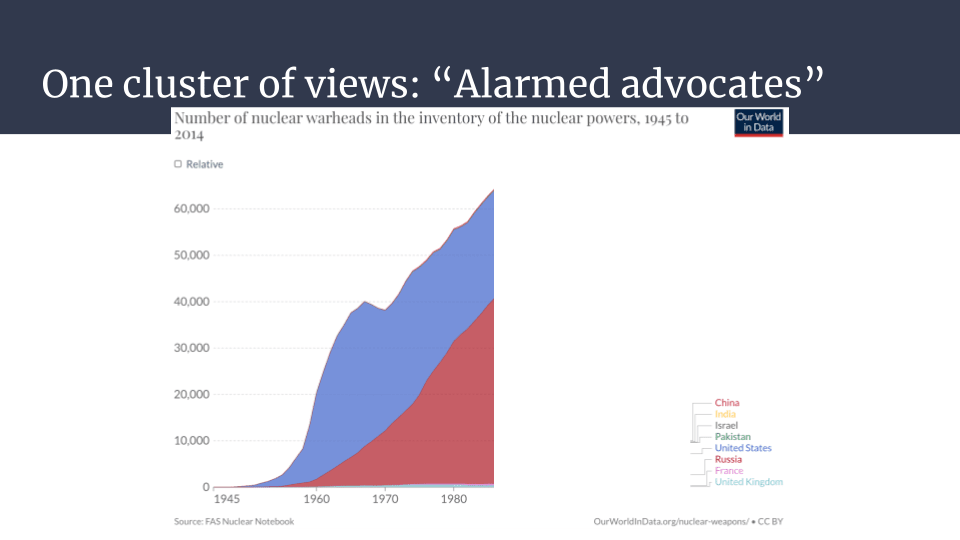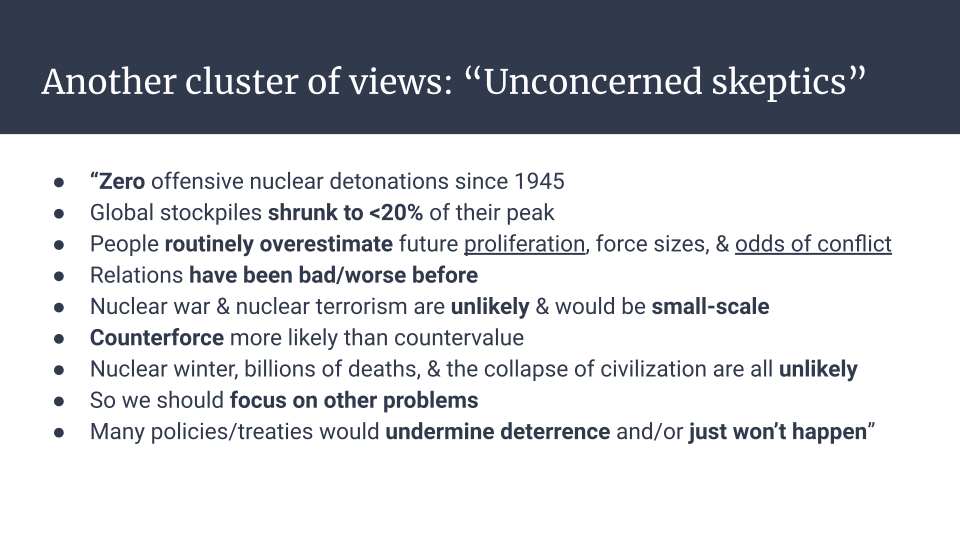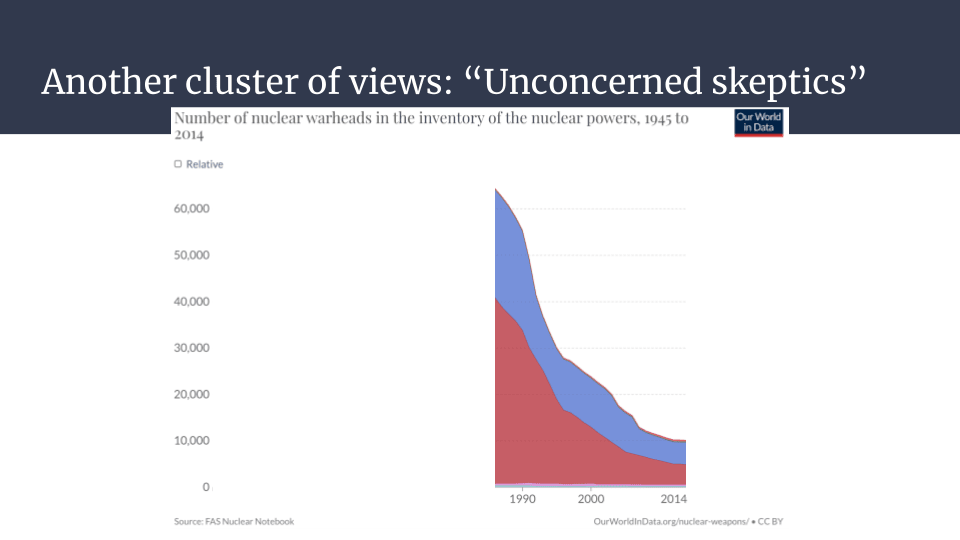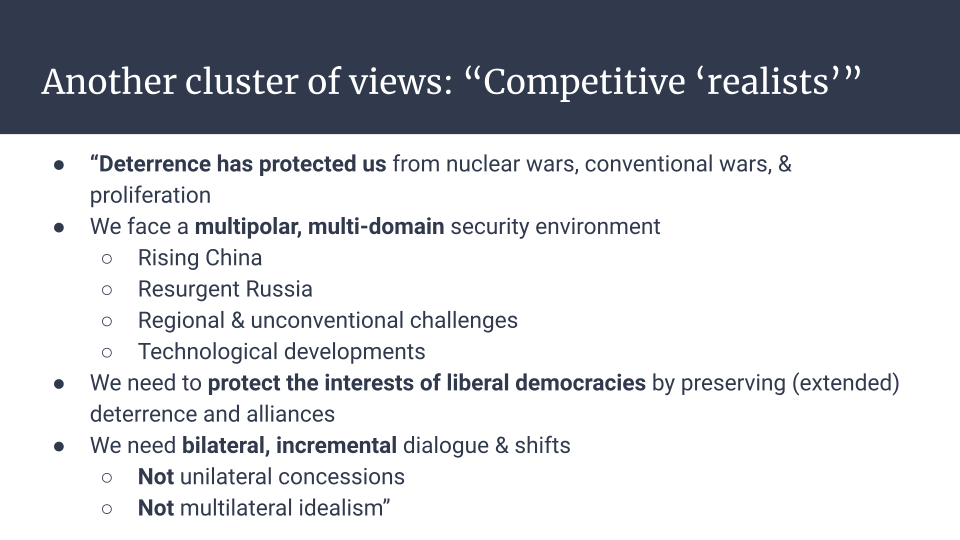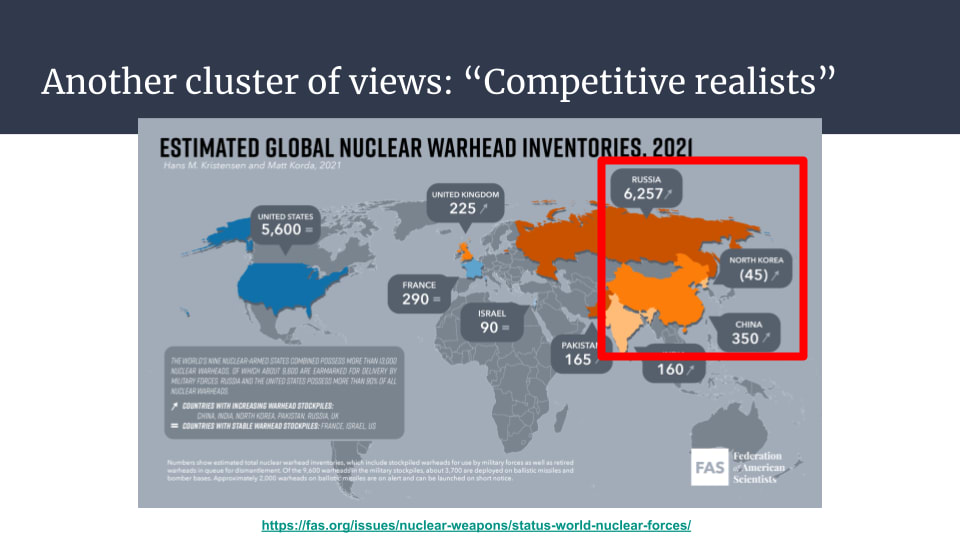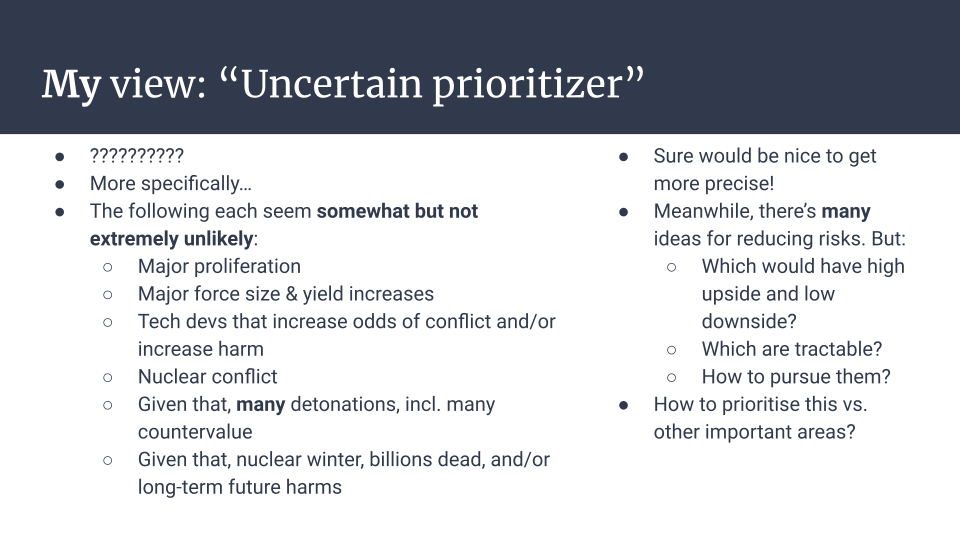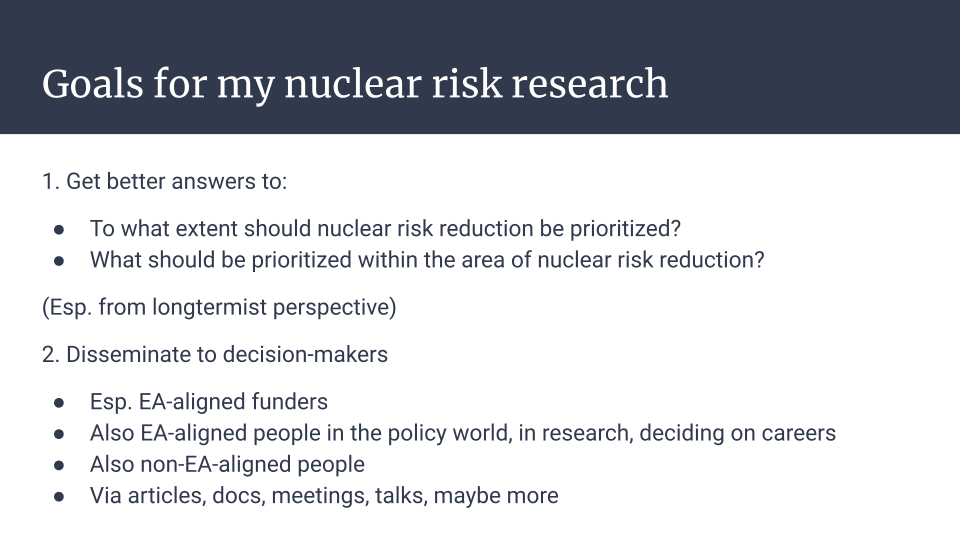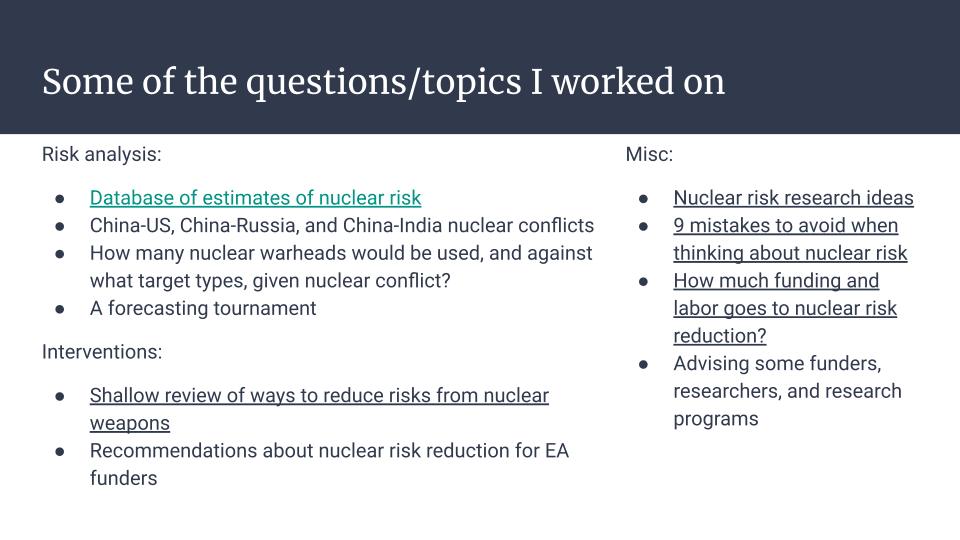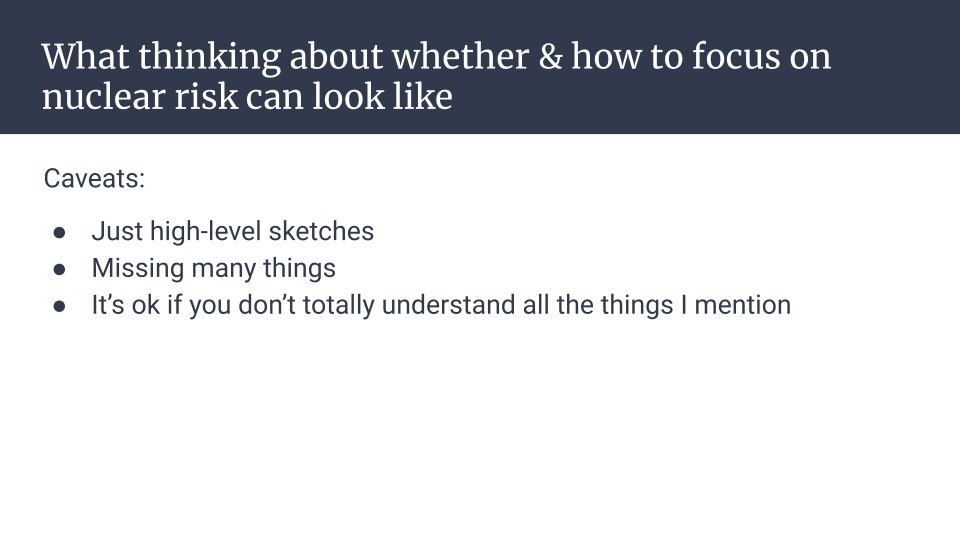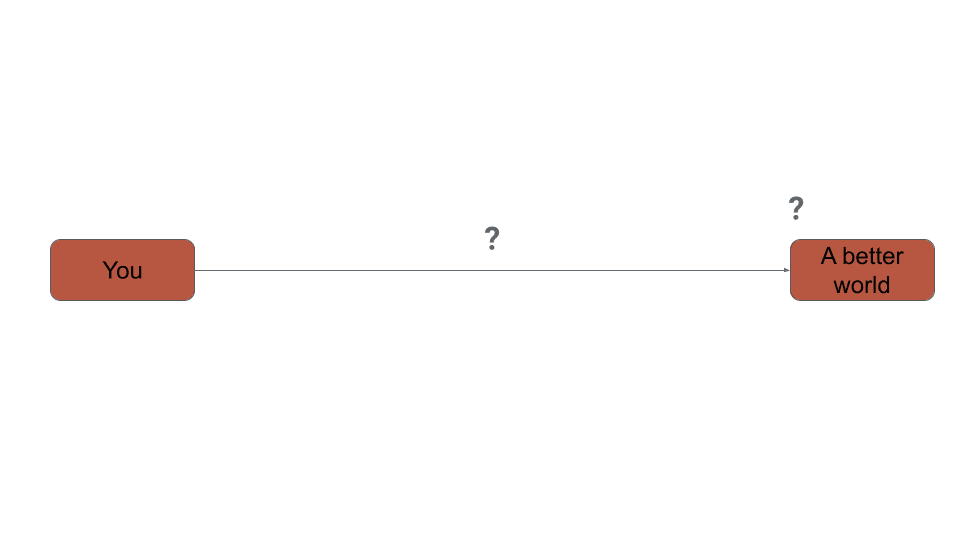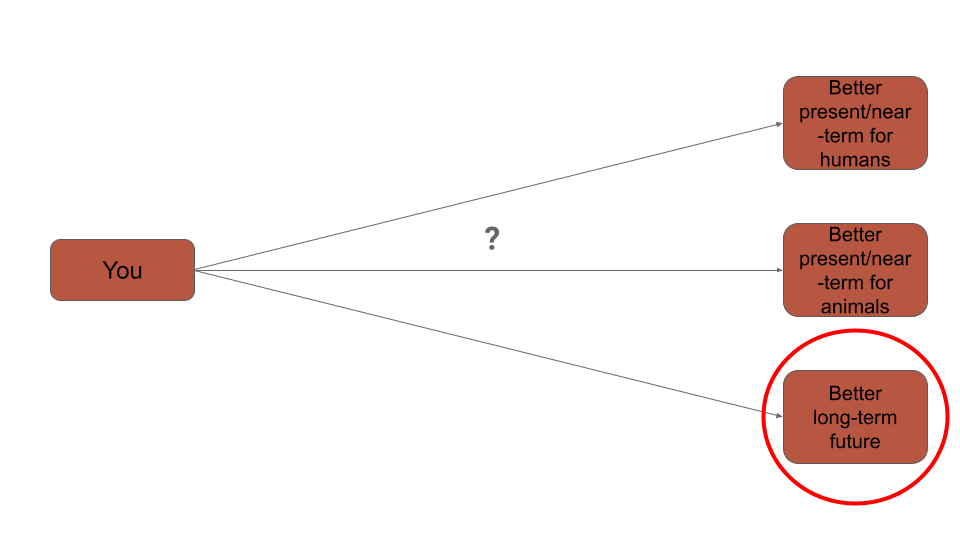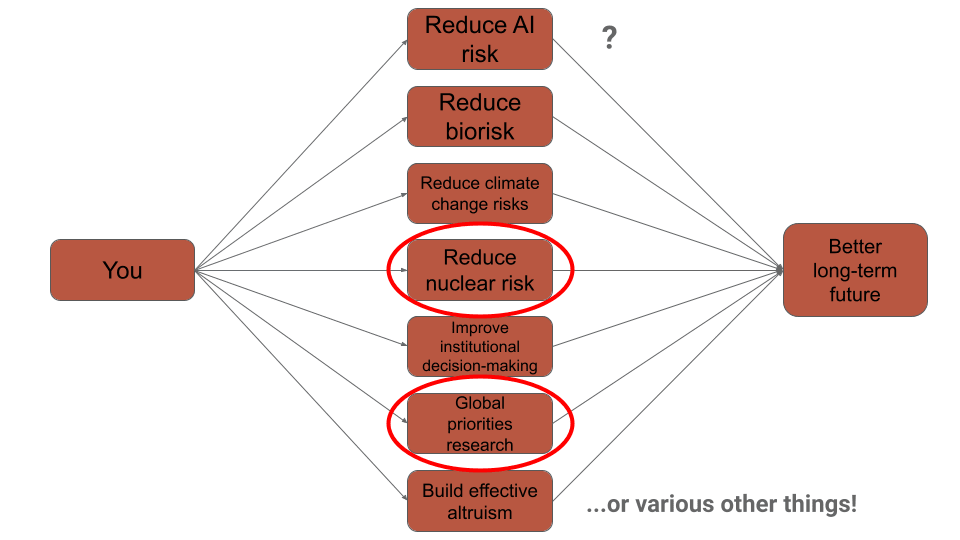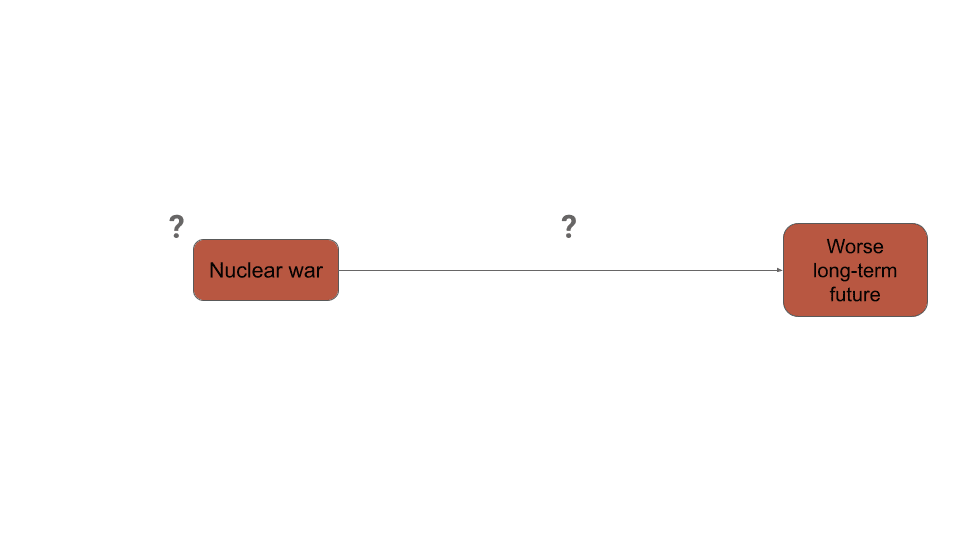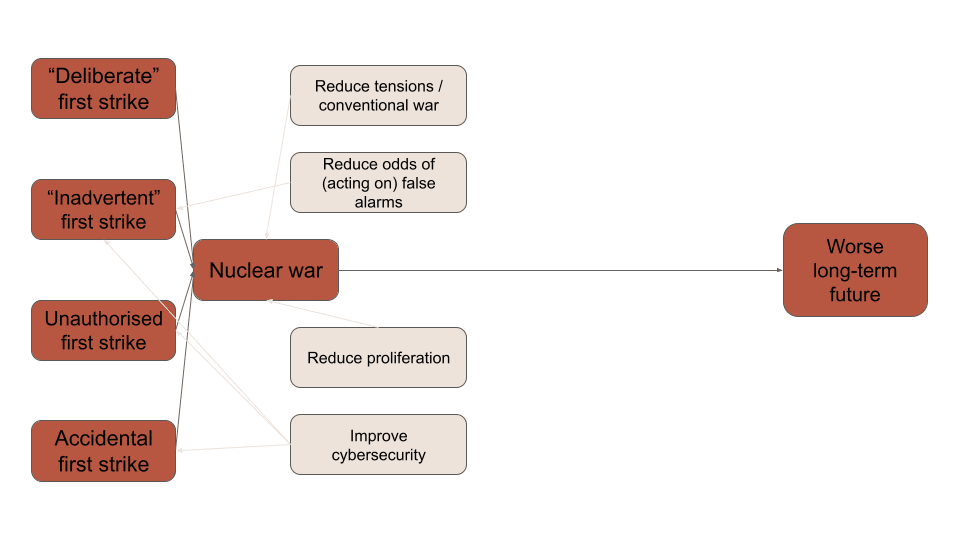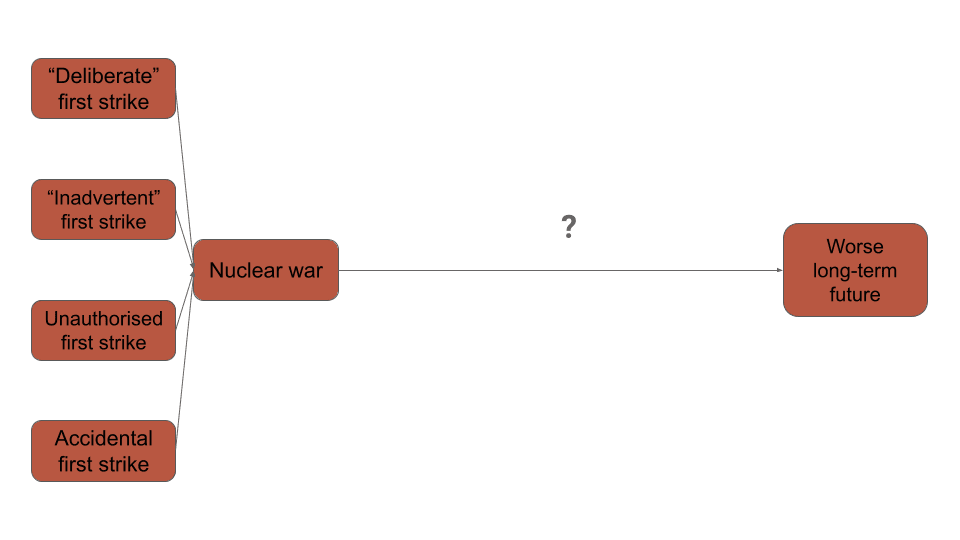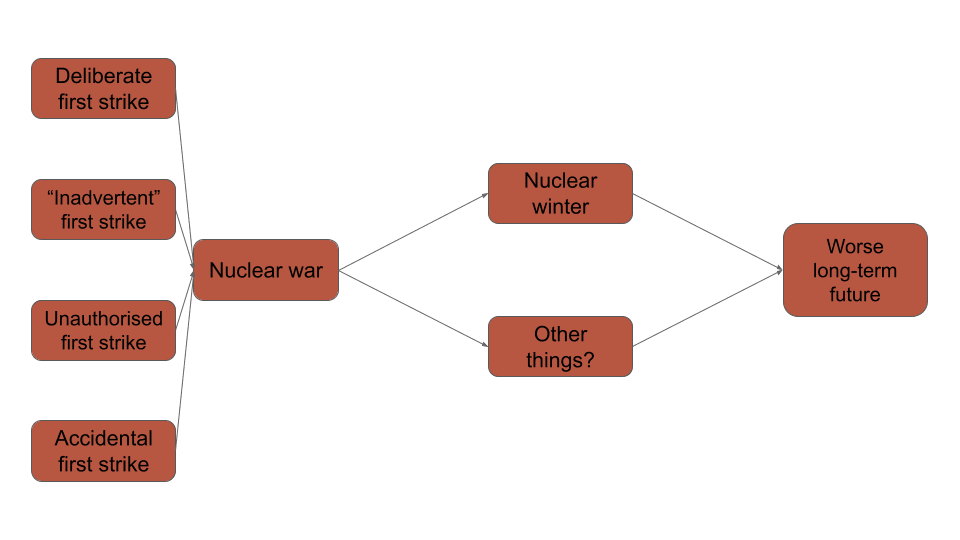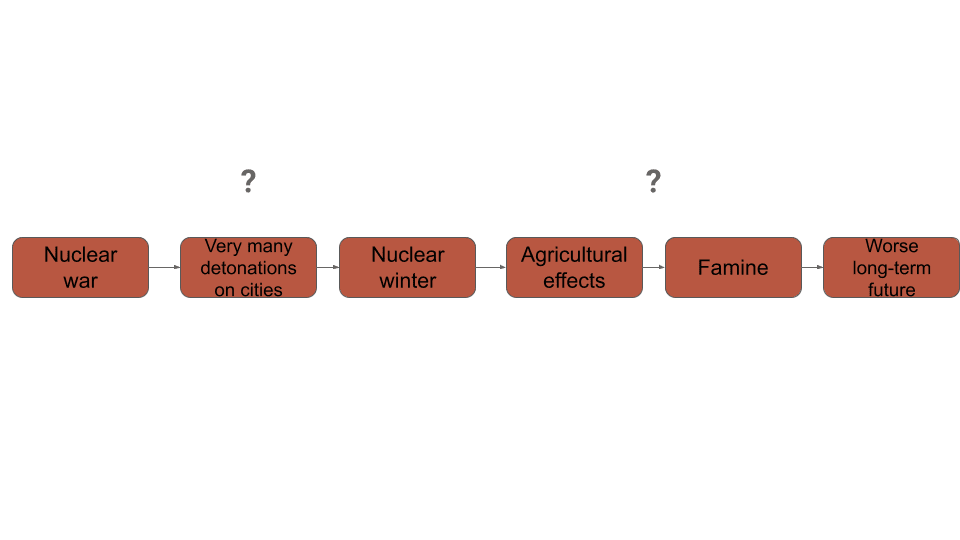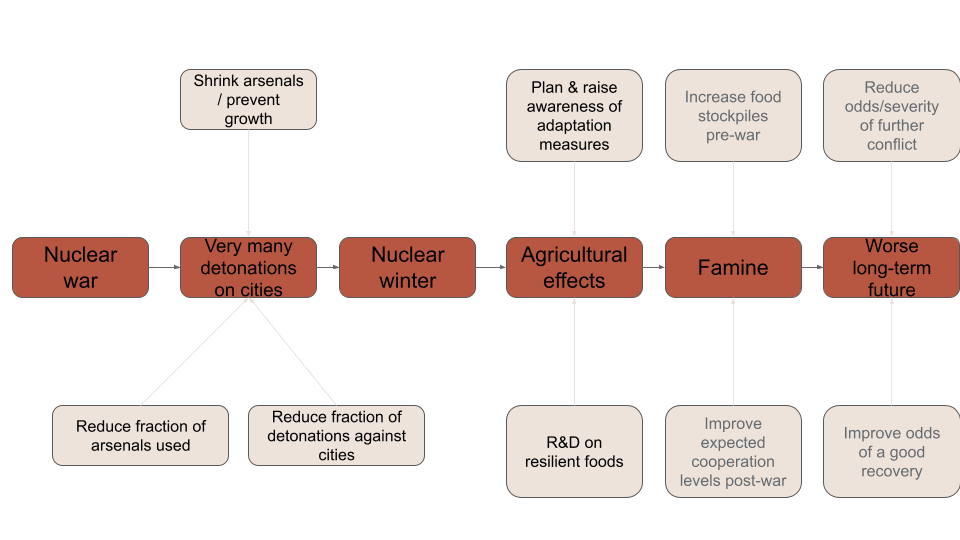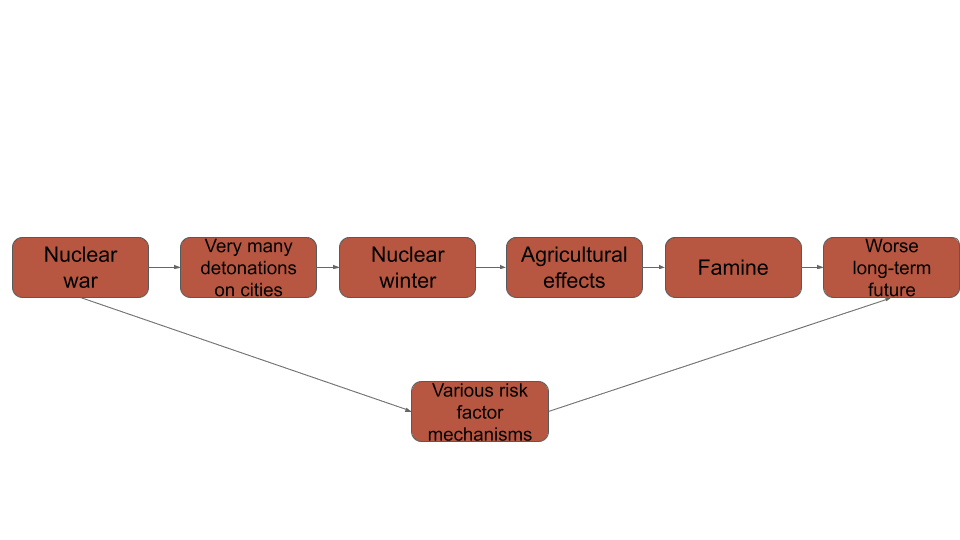Nuclear risk, its potential long-term impacts, & doing research on that: An introductory talk
By MichaelA🔸 @ 2023-04-10T15:26 (+50)
This is a Forum post version of a talk I gave in August 2022 to students interested in an impactful career. I'm publishing this because I expect some people to find it helpful as an accessible introduction to nuclear risk, why nuclear risk reduction may or may not be a longtermist priority, and longtermism-related cause prioritization research.
This is a blog post, not a research report, meaning it was produced relatively quickly and is not to Rethink Priorities' typical standards of substantiveness and careful checking for accuracy.
Introduction
Some clusters of views on nuclear risk
Over the next few slides, I outline three clusters of views that seem to be common in mainstream/non-longtermist nuclear risk, in my experience. This is my own attempted clustering and my own (perhaps too uncharitable) terms for the views.
The text in the slides is my impression of what someone whose views approximately fit the given cluster might say; I don't personally agree with all of these statements/framings myself, though I do think each cluster of views makes many valuable points.
Above is the Our World in Data graph of nuclear weapons numbers by year. An "alarmed advocate" might point to that part of this graph – the ascent up a mountain of destruction and doom.
Above is a different part of the same graph. An "unconcerned skeptic" might point to that part – the descent back down the mountain of doom, toward stability and reduced risk.
A competitive realist might point to that evidence of rise and/or resurgence of nuclear powers whose national security interests differ from those of the US and allies.
My nuclear risk research
Unfortunately much of that work will probably remain unfinished. But here are links to the things that I at least got to some shareable state:
- Database of nuclear risk estimates [draft]
- Nuclear Risk Tournament
- Intermediate goals for reducing risks from nuclear weapons: A shallow review (part 1/4)
- Nuclear risk research ideas: Summary & introduction
- 9 mistakes to avoid when thinking about nuclear risk
Some paths by which nuclear risk can affect the long-term future & some interventions that could help
Ok, so let's imagine you want to help bring about a better world (in expectation) than the world we'd have without your efforts. What high-level end-goals might you focus on?
Three possibilities that seem especially notable to me are better present/near-term future for humans, better present/near-term future for animals, or better long-term future. Let's say you decide to focus on the long-term future, or at least to see what that would imply. What are some still fairly high-level areas which seem potentially important for the long-term future?
Ok, there's a fair few. Let's say you decide that you specifically (maybe due to comparative advantage) should focus on nuclear risk or global priorities research (e.g., specifically trying to see how important nuclear risk is relative to those other areas). So now let's think about why nuclear risk might matter for the long-term future. Then from there we can try to assess what interventions might be most valuable (by blocking the paths from nuclear risk to long-term future harms).
Maybe let's first think about some ways nuclear war could occur, and some interventions that could stop each of those causes.
Ok, but what about the path from nuclear war actually happening to the long-term future being worse. By what specific mechanisms could the world get worse? Can we intervene to prevent those mechanisms/paths, even if a nuclear war occurs? (It seems probably best to work both on "prevention" and "mitigation", as part of a defense in depth approach).
Ok let's zoom in first on the nuclear winter path. What are the individual steps in this path? How could we block some steps from happening?
There are probably also various other ways nuclear war could plausibly affect the long-term future, but we don't have time for them now.
Some options for further learning or next steps
- "Risks from Nuclear Weapons" - Effective Altruism Forum sequence
- 80,000 Hours’ podcast episodes on nuclear risk
- Studying in a relevant area
- Existential-risk-focused summer research fellowships
- E.g. Cambridge Existential Risk Initiative
- More listed here
- Internships listed in 80,000 Hours’ job board
- "Interested in EA/longtermist research careers? Here are my top recommended resources"
- An interview with me on the Hear This Idea podcast (touching on my nuclear risk research and on my tips/lessons learned for research)
Acknowledgements
My nuclear risk work was supported by Rethink Priorities (though I ended up pivoting to other topics before having time to get this up to RP's usual standards). I'm grateful to Will Aldred for help adapting this talk into a Forum post. Mistakes are my own.
If you are interested in RP’s work, please visit our research database and subscribe to our newsletter.
Matt Boyd @ 2023-04-10T23:40 (+10)
Thanks for this great post mapping out the problem space! I'd add that trade disruption appears to be one of the most significant impacts of nuclear war, and plausibly amplifies the 'famine' aspect of nuclear winter significantly and a range of potential civilisation collapse risk factors, see my earlier post here: https://forum.effectivealtruism.org/posts/7arEfmLBX2donjJyn/islands-nuclear-winter-and-trade-disruption-as-a-human Trade disruption disappears into the 'various risk factor mechanisms' category above, but I think it's worth more consideration. Here's a report on a workshop we recently ran on nuclear winter risk and New Zealand and how the impact of trade disruption pushes nuclear war into the very severe regions of a risk matrix: https://adaptresearchwriting.com/2023/02/20/workshop-on-nuclear-war-winter-nz-wellbeing-of-millions-and-1-trillion-plus-at-risk-strategic-resilience-must-become-bread-butter-nz-policy/ We now have a survey across a range of sectors in pilot to better understand the cascading impacts of such disruption on NZ's technological/industrial society (and how to avoid collapse). The full survey will be deployed soon. A lot of likely resilience measures against nuclear winter will have co-benefits across a range of other 'ordinary' and catastrophic risks, we hope to identify those with Delphi processes later this year. Project outline here: https://adaptresearchwriting.com/2022/09/13/introducing-the-aotearoa-nz-catastrophe-resilience-project/ I'd be interested to chat with anyone at Rethink Priorities who is continuing your work.
Matthew Rendall @ 2023-04-12T21:58 (+5)
Good you're doing this! One suggestion concerning your argument: when assessing the impact of nuclear weapons, it's helpful to think about their likely effects over the short and long term.
Nuclear war probably is 'somewhat, but not extremely unlikely' over the next few decades. If we retain nuclear weapons for centuries, on the other hand, it's very likely indeed.
Similarly, I agree that it's important to recognise that nuclear weapons have significant advantages for their possessors (as you mention in your '9 mistakes'), including increasing their security in the short term. But a state that tries to keep up nuclear deterrence forever is almost surely dooming itself to an eventual nuclear war.
I elaborate on these considerations in a recent paper here: https://onlinelibrary.wiley.com/doi/full/10.1111/1758-5899.13142. Here, as elsewhere, we need to take the long view as well as the short one.
